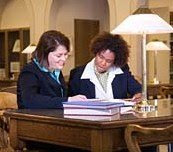
If you're looking for some very easy Christmas activities to use this week, check out the sites listed here. Many have accompanying worksheets, puzzles, and activities that are free of charge.
- A simple explanation--with pictures--of common holiday themes. Click here.
- Bingo! Print out these Christmas Bingo cards to use with intermediate-level students.
- I printed out the slides of this Christmas vocabulary Power Point and shared them with my students. High-beginning and up.
- ESL Christmas flashcards are here and they're free!
- The History Channel has lots of information both in text form and video! My intermediate-level students understood a lot of the video information. Click here for the Christmas Home Page, and be sure to check out the links on the left side of the screen, especially "Fast Facts."
- One of my favorite Websites, HowStuffWorks, has the most in-depth Christmas section on the Internet (so far). Start by clicking here, and look around. You'll be overwhelmed, I promise!
- BogglesWorld always has something for just about any holiday or social situation you wish to discuss with your student. Click and check out the New Year's stuff.
If your student is Muslim, you should know that the biggest holiday of the Islamic year, Eid-al-Adha, starts on Wednesday, December 20. 
What is `Eid Al-Adha ? The `Eid Al-Adha is a major religious event in the lives of Muslims. Usually, communities celebrate this occasion over a period of several days. Although only the pilgrims in Makkah can participate in the Hajj fully, all the other Muslims in the world join with them by celebrating the `Eid Al-Adha, or Festival of Sacrifice. On the 10th of Dhul-Hijjah, Muslims around the world wear their nicest clothing and attend a special prayer gathering in the morning. This is followed by a short sermon, after which everyone stands up to hug and greet one another. The traditional `Eid greeting is "`Eid Mubarak," which means "Holiday Blessings." Next, people visit each other's homes and partake in festive meals with special dishes, beverages, and desserts. Children receive gifts and sweets on this joyous occasion.
In addition, like the pilgrims in Makkah, those Muslims who can afford to do so offer domestic animals, usually sheep, as a symbol of Abraham's sacrifice. The meat is distributed for consumption to family, friends, and to the poor and needy. (information courtesy: http://www.islamonline.net/)
To find out more about this holiday--as well as why sheep and/or goats are so important to this festival-- visit Wikipedia's excellent Webpage on the subject.










No comments:
Post a Comment